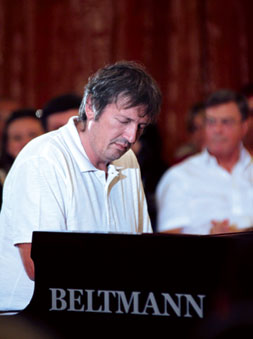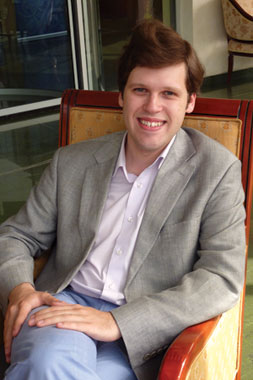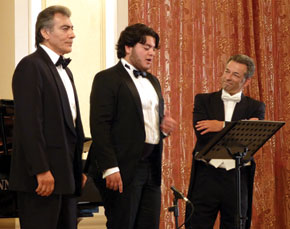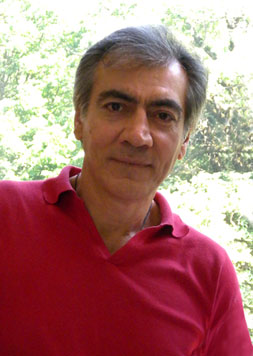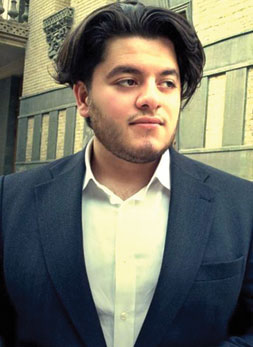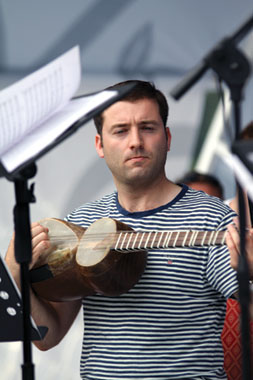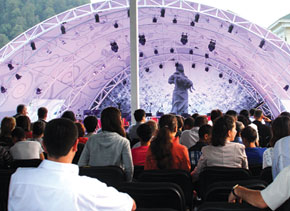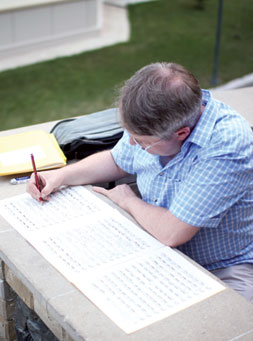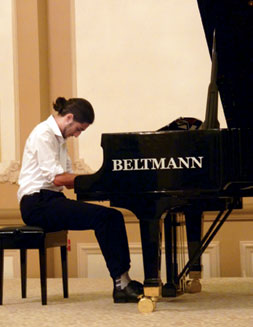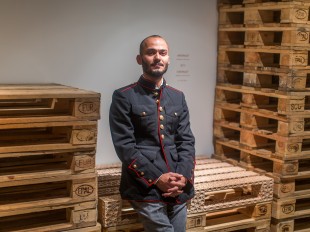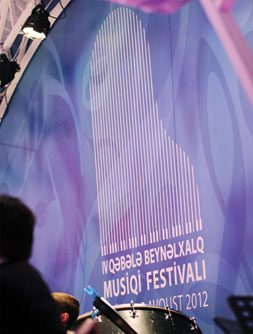
Pages 8-18
- International Inspiration –
For two weeks from 24 July, the hills of Qabala were alive with the sound of musicians of many nations thrilling packed audiences with works from mugham, Mozart, Mascagni and many others. Returning favourites, not least the Royal Philharmonic Orchestra, confirmed their brilliance, but there were also new names – and brand new music – to savour. Sponsored by the Heydar Aliyev Foundation and the Ministry of Culture and Tourism, the festival programme also owed much to its workhorse Artistic Directors Farhad Badalbeyli and Dmitry Yablonsky. Here we try to bring you a sense of the flavour detected by players and listeners. If you get half a chance to visit next year, what’s to lose? – all this for free?
Impressions of Qabala
by Colleen MacDonell
The vast majority of people attending the Qabala International Music Festival are from Azerbaijan. The festival is international because of the performers. And this year, what an impressive collection they were! The London Royal Philharmonic Orchestra, the Moscow Soloists, the Tartini Quartet. Famous pianists from Russia and France. A composer from Russia. Virtuoso performers on the violin, cello, viola, and double-bass from Russia, America and Slovenia. Conductors from Russia, Switzerland, Italy, and Poland. Singers from Italy. Then add Azerbaijan’s own world-class musicians: The Uzeyir Hajibeyli State Symphony Orchestra of Azerbaijan, The State Choral Capella of Azerbaijan, conductors, composers, khanendes, singers, violinists, pianists, and players of the cello, saxophone, clarinet, tar, kamancha, qanun, nagara, and balaban. All explained and introduced with style and grace by People’s Artist Professor Zahra Guliyeva.
As one of the foreign invitees, I was asked to give my impressions. What a daunting task. Can one say ‘I was blown away’ in a feature on a classical music festival? Perhaps not, but it’s true.
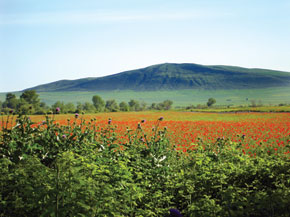 Natural beauty
Natural beauty
One’s first impression of Qabala is of a world of pristine, natural beauty. If you travel by road from Baku, the trip itself gradually prepares you for the spectacular scenes that await. The arid Absheron Peninsula gives way to rolling farmland, vineyards and grazing herds of sheep, cattle and water buffalo. Then the mountains! The dizzying perspectives from forested peaks across fertile valleys! One is glad to have a moment to recover one’s senses under the trees at an outdoor tea house, breathing the pure mountain air.
Then on once again to more dramatic mountain ranges still. Qabala seems the culmination of all of this. Craggy peaks tower above immense hills covered in mixed deciduous forest. Nestled in one corner of this magnificent beauty is the Qafqaz Resort that is host to the famous festival.
A spirit of generosity
What makes Qabala’s festival special, if not unique, is that the concerts are free. Music lovers gathered early every evening outside the chamber music hall in order to get a good seat. It was always a full house. Later the crowd moved to the outdoor stage for a much bigger open-air concert. Seating was provided at ground level and on a raised platform. These concerts were exceptionally popular. In fact, so many people attended that the festival organizers brought in truckloads of extra chairs on several occasions and set them up on the grassy slope overlooking the stage. There was a real feeling of excitement in the crowd before each concert and very appreciative ovations at the end.
Another remarkable aspect of this spirit of generosity is the fact that musicians are invited to stay at the luxurious resort – not just because they are performing, but so that they can mix with other musicians and attend their concerts. It was quite thrilling for me to rub shoulders with so many world-famous musicians. And it was lovely to see so many animated conversations going on between musicians as they gathered in the resort’s dining hall.
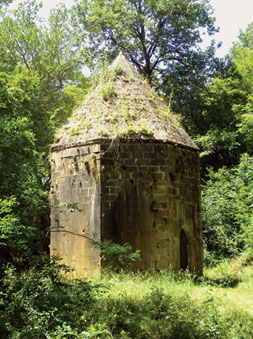 A sense of intimacy
A sense of intimacy
Another extraordinary thing about the festival in Qabala is the sense of intimacy between the audience and the performers. This was especially true of the concerts in the chamber music hall. For two of the concerts the room was set up ‘in the round’; the audience surrounded the performer. The piano recitals by Andrey Yaroshinsky and Boris Berezovsky were breath-taking to behold at such close quarters. But the same was true of the performances on the small stage. You had the feeling that you could just reach out and touch the musicians. In fact, after each concert the performers very graciously spoke to fans, shook hands and had photos taken.
Warmth and hospitality
Qabala is in the heart of Azerbaijan and its residents live up to this country’s reputation for hospitality towards strangers. During a walk through the woods my companion and I were invited for tea at a rustic outdoor table. There we were treated to the famous local jams – murebbe – and samovar tea. Local people are happy to meet foreigners and eager to know where you are from. Though most people in the town don’t speak English, their smiles speak the universal language of hospitality. At the resort itself, the staff were exceptionally helpful and friendly. When I had questions about the ingredients in dishes, the chef would come out of the kitchen to personally answer my questions. The level of service at the resort was very high indeed.
Come and Relax
The resort itself is designed for relaxation and fun. During the day you can lounge by the pool, go horseback riding, bowling or hiking, learn to drive a Segway, take a nature tour in an ATV, visit the spa, or enjoy the natural beauty of mountains and waterfalls. At night you can choose to sit in a quiet café or dance the night away in the nightclub. Just down the road is an amusement park full of exciting rides and activities for the whole family. Qabala truly has something for everyone.
I took a taxi back to Baku the day after the final concert. When the driver discovered that I liked mugham, he stopped at a local shop in the town and helped me pick out a DVD, which he played on two screens in the headrests, airplane-style. We drove back through the dramatic countryside to the strains of some of Azerbaijan’s most famous musicians singing and playing Azerbaijan’s most famous contribution to the world’s musical culture. It was magic.
Canadian Colleen MacDonell has lived in Baku for 5 years, working as a teacher-librarian at The International School of Azerbaijan. This was her first visit to the Qabala International Music Festival.
Andrey Yaroshinsky
- to give is to receive –
Among this year’s returners to Qabala was Andrey Yaroshinsky, a young (born 1986) Russian pianist. A couple of previous visits to Azerbaijan, the first aged 14 to benefit from a meeting with Mstislav Rostropovich - It was like a miracle that changed my life - had perhaps tuned him in to the country and helped him to triumph in last year’s 2nd Qabala International Piano Competition.
Unsurprisingly, Andrey is happy to be in a country with such memories, but his enthusiasm is still striking:
Wonderful people and atmosphere at the Qabala Festival…. There are such creative people and everyone contributes. The great dominance of the atmosphere and you feel you must give a performance…
In fact there were three Yaroshinsky performances this year; the first as part of an all-Russian trio and quintet, confident in their cooperation, in a recital of Schubert’s Trio in B Flat Major and the Trout Quintet. The following evening a very well received solo concert featured works by Bach, Albeniz, Schumann and Rachmaninov; the inevitable calls for encores brought out the populist, with Carmen. Two nights later he was back with his compatriots, this time in a quartet for a recital of piano quartets by Mozart and Schumann.
Of apples and candles
His piano work in the chamber recitals was notably both contributive and supportive, while the solo concert was an assured performance of a varied agenda. We were naturally intrigued to probe the personality and wondered which of solo or chamber group had greater appeal for him. His philosophically illustrated response was refreshingly in the festival’s collaborative spirit;
When you play solo of course, from one point of view you feel more free… but chamber can help you to get much more freedom. If you give someone a piece of your apple, you have less. But if you give someone a light from your candle, you have twice more….
Of course, in chamber music, it all depends on who you are playing with….
Human relations are very important. From this point of view I am very happy this year because we have a great company… it’s a great honour and really a great joy when you can play with such wonderful musicians; you can do something you did not do before….When you play in an ensemble it is also important to have a desire not only to play but to give, or it won’t work. You must be open and friendly and be ready to change something.
Such is a musician’s life that although the quintet previously knew of each other, they had only managed to get together in Moscow for two days’ rehearsal and in Qabala the day before their first performance. Does he have any problem working with people with different personalities?
What a horror it would be if we were all the same!.. The combination of different characters makes it more powerful.
Music for all life
Starting to play music at the age of four, ‘a bit too early, maybe’, the seven year old Andrey wrote in a notebook, ‘Music is my life’, and he maintains that this is still true.
Everything is connected with music: the travelling, the creation, belief in God, the feeling of love….when you play Schumann and you know the story of Clara…. you can always feel what love is.
….It is also our work of course and there are problems…. but my dream is never to stop.
Andrey talks instructively and with a passion about how music allows you to ‘touch the wisdom of the composers and colleagues’, but to do this the musician must absorb the different cultures; for many of the great composers you must know about Vienna and the Hapsburg Empire. Referring to Albeniz, whose Iberia Suite was part of his solo recital, he describes the bringing of the sun into a new Spanish language and writing for the piano. It was enough to send this musical amateur off on a new search, but not without hearing the advice that absorbing the culture and music is not only a matter of academic study; you should also enjoy life and sometimes ‘walk without an umbrella’.
Azerbaijan?
I understand that it is a country of great joy….I can say that it is greatly moving forward. I don’t know all about the politics and social events, but the culture, and the Qabala Festival is a good example of the desire of the people of Azerbaijan to move on….It is only the fourth festival but it is already well known…. From the point of view of the music, to play in such good company, my God, it’s fantastic! I won the piano competition and we are kinds of ambassadors for the festival when we write these things on our CVs…A year ago I couldn’t have imagined how fantastically beautiful Qabala is, now when people ask where I am going and I say Qabala, they say ‘Oh yes, yes, we know’…. The wonderful nature and air, you just want to drink it! And there is fantastic work by the organisers. And I know when I come here I will have five days of joy, five days of creation and a wonderful public.
I met Rostropovich in Baku and he changed my life, now I’m here in Qabala and there are always these connections, then I was a boy now I have different status. But he told me ‘You must always remain the beginner…. I am seventy-five and I’m a beginner.’
The maestro’s advice ties in with Andrey’s belief that everyone has a talent and if you are lucky enough to discover you own then you have a responsibility to develop and enjoy the pleasure of giving. Andrey Yaroshinsky’s playing and company were certainly significant contributions to the joy of the Qabala Festival.
Three Tenors Talk
On 28 July a ‘Three Tenors’ concert in the Chamber Music Hall, Qafqaz Resort Hotel featured Adil Akhundov and Azer Rzazade in their home country and Ottavio Palmieri from Italy, with his compatriot Giovanni Brollo accompanying . This was the first time the singers had performed as a trio. However, in just a couple of days they put together an exceptional show of Italian opera and Neapolitan songs; they ended with an Azerbaijani song and brought the audience to its feet. We sought out the men behind the voices…
Ottavio Palmieri & Giovanni Brollo
In fact, Giovanni Brollo´s relationship with Azerbaijan first began when he met his future wife, Saadet, who was working in Milan at the time. She is a regular returner to her homeland but Giovanni had only previously managed a couple of stopovers in Baku. With Ottavio, they were planning a few days in the capital on the return trip to Italy, the singer having been intrigued by the film clips shown during Eurovision.
In fact the Qabala visit was something of a cultural exchange, they explain; in May Dmitry Yablonsky and Farhad Badalbeyli (Directors of the Qabala Music Festival) together with Sabina Asadova and Yusif Eyvazov (all except Dmitry are Azerbaijani), had performed at the Ruggero Leoncavallo Music Festival in Italy, of which Ottavio is director.
We ask how it felt to sing in Azerbaijani and Ottavio loved it, adding that he had also performed in Azerbaijani at the festival in Italy. It seems that he is already a huge fan of mugham and would very much like to sing more Azerbaijani music. The open air Mugham Night following his concert was a great treat - he gestures enthusiastically as he explains his liking for mugham.
Even although I don´t understand the words, I can still feel the depth of expression and emotion, the depth of feeling and, in fact, it feels almost religious because it´s so deep, and they talk about the call to prayer and the relationship between the azan and mugham. Sometimes I close my eyes and the music takes over. My uncle is a choreographer and I used to ´watch´ him with my eyes closed and still ´see´ the meaning. It´s the same with mugham.
Giovanni, on the other hand, says he most definitely likes to watch musicians, because for him the body movement and interaction with the instrument is very important.
I show them a photo of a lady in the Qabala audience I had noticed out of the corner of my eye. The pleasure she was experiencing, watching and listening to these performers was so clear from her expression; she was totally absorbed.
Our guests respond that they had been surprised that so many people, children and adults, had attended, and that they had felt their appreciation.
Ottavio recites a favourite expression;
A country which does not support its music is a ´poor´ country.
He is pleased to note that the opposite is the case in Azerbaijan and that as life in Azerbaijan develops, culture is not forgotten. Even winning Eurovision showed how far Azerbaijan had come, and it was such a nice song, he says.
As for Qabala itself, Giovanni explains that it reminds him of his home on Lake Como’s shore. Although he had been in Baku those six years ago, he really hadn´t expected such a change or the wonderful countryside, despite Saadet’s assurances! He adds that he likes the people in Qabala too, the friendly hotel staff, and food, the local Khanlar restaurant nearby.... In confirmation, Ottavio admits to putting on two kilos in just a couple of days.
A tour of the Beltmann piano factory had also impressed with its high quality and they looked forward to the pianos appearing in Milan. Coming from singer Ottavio Palmieri and pianist Giovanni Brollo, that´s a good endorsement.
[Interview by Fiona Maclachlan with thanks to Narmin Babayeva and Giovanni´s wife Saadet for their help and translation]
Adil Akhundov
We caught up with Adil Akhundov the day after the concert to ask for his impressions of the festival and were met by a soft-spoken man who immediately puts one at ease with his warm and courteous manner. He was very happy to be performing for the first time at Qabala. It was thrilling for him to see an international festival of this calibre taking place in his native country.
It’s very impressive. The natural beauty of Qabala, the wonderful musicians, the excellent resort and services – everything here is top notch.
It was especially good to be back in Azerbaijan. A native of Baku, Akhundov has spent the last 12 years studying and working in Europe.
People here have a saying – ‘If you are at home, even the walls can help you.’ It is very special for me to be back after such a long time.
Based in Amsterdam, where he earned a bachelor’s degree at the Amsterdam Opera Academy, Adil studied later under the famous American dramatic tenor James McCray. He describes his teacher as a pivotal influence on his career. At the age of 70, McCray had a wealth of experience and knowledge to pass on.
The Three Tenors programme was largely Italian. Although Akhundov performs in French and German (and Azerbaijani, of course), his first love is Italian opera. The music, he explained, is very close to my heart. Akhundov believes that his voice – its timbre, its quality – is particularly well-suited to Italian operatic songs. He has travelled and performed all over Europe, but Italy has a special attraction.
One surprise in the programme was the inclusion of an Azerbaijani song by the famous composer Tofiq Guliyev. Why this song – Sənədə Qalmaz [And Nothing Left for You]?
It was suggested to us. I love all of Tofiq Guliyev’s songs. My favourite is Qəmgin Mahnı [Sad Song]. Perhaps one day I will get a chance to perform that song as well.
Adil is now back in Azerbaijan to stay. He notices many changes in Baku. The city has really grown and changed in the last 12 years. That’s a long time, he admits and says that he was feeling very homesick. Now that he is back, what are his plans for the future?
First of all, he has been asked to sing the lead in Tosca at the Opera and Ballet Theatre. The premiere will take place in October. Has he performed this part before? Yes, but never in Baku. He graduated from the Baku Music Academy and had gone on to perform at the opera house. However, he says, that was so long ago that it will feel like the first time.
He is looking forward to performing in Baku again. When I sing, the most important thing for me is to give people the highest level.
Welcome back Adil!
Azer Rzazade
Azer Rzazade is now just 22 and he only began to study singing three years ago. Previously he had worked for a bank and for security and oil companies. He is also well-known in Azerbaijan as a professional athlete; a kickboxing champion at competitions in Athens (2006) and later at the Eurasia Championship in Tbilisi.
This was Azer’s second Qabala festival. And a busy one it was, with six concerts. We managed to find him on a ‘rest’ day – though he turned out to be performing that evening as well! In his casuals he looked more like an American football player than an opera singer, but that evening, dressed in formal attire, he was every inch the dramatic tenor, a powerful stage presence.
He has followed the festivals since their inception, commenting on the many foreign musicians: conductors, violinists, pianists, singers. It’s a big festival! And this year, it was especially thrilling for him to hear the Royal Philharmonic Orchestra playing Azerbaijani music.
You can see interest in this festival growing every year. So many people are interested in classical music. Of course, people can come from the regions to Baku, but here they can enjoy the music without tickets to pay for. And Qabala is such a beautiful setting for a festival of this kind. I thank Farhad Badalbeyli, the Director of the Baku Music Academy, and the Ministry of Culture and the Heydar Aliyev Foundation for making this possible.
And when he’s not performing?
I am looking forward to hearing the great pianist Boris Berezovsky. I heard him play last year. I’m a singer but I’m interested in these kinds of musicians and the performances of international stars at Qabala.
We interviewed Azer the day after he sang with Adil Akhundov and Ottavio Palmieri and he also commented on the inclusion of Tofiq Guliyev’s Sənədə Qalmaz:
It is a wonderful thing to hear a foreigner performing our Azerbaijani songs.
Currently studying at the Academy of Music in Pesaro, Italy, Azer is still in the very early stages of his career:
I’m not satisfied yet. I’m still growing and developing as a singer... and Italy is the native land of the music I wanted to sing... The first 2 or 3 months were difficult. I mean, I’m only 22, I was new there and had no friends. However, if you have a goal you have to stick with it.
What made you pursue a career in music?
As people here know, I was born into a musical family. My father, Zaur Rzayev, is a singer. I liked to sing when I was young but I was very shy. Before my singing career I wasn’t actually aware of my talent. I worked in a bank. But I couldn’t shake the feeling inside. It was like a volcano – I wanted to sing. Professor Huseyn Aliyev was my teacher in Baku and helped me every day with arias. I couldn’t do it at first, but he was very patient. So, I’ve already had a very interesting life. I don’t regret the path I’ve chosen, although it is a difficult one. It might have been easier if I had gone to the Bulbul School of Music, but I’ve been studying for three years and made progress.
And the future?
I’m learning operas – Verdi’s La Traviata and Simon Boccanegra. First I want to sing them here in Azerbaijan at our Opera and Ballet Theatre and then I would like to represent our country with performances in Italy.
[Adil Akhundov and Azer Rzazade interviews by Colleen MacDonell and Nigar Javadova]
Sahib Pashazade
– a tar in heaven –
Mainly, of course, a festival of classical music, Qabala also gives the stage to local traditional music, thus our determination to catch Mugham Night on 18 July. Luckily we succeeded, for it revealed even more than anticipated and proved to be a lead-in to the world premiere which featured later in the week. As is always the case, this was one of the most popular concerts; an extra truckload of chairs was called in as locals streamed up from the town to enjoy the pleasure of mugham in the open air of the forested Caucasus – and pleasure it was.
Spiritual nourishment
Three khanendes (master singers) gave their all on folk and mugham classics; Ilkin Ahmedov particularly catching the ear with a distinctive ring to his voice. All the while notes were being jotted about the sound of the tar playing. Although he is an Honoured Artist of Azerbaijan and laureate of many festivals, the name Sahib Pashazade had not registered with us. No longer.
We sat down with him for tea and a chat on the warm, shady terraces below the Qafqaz Resort hotel, the day before he was to perform in that world premiere we mentioned.
As you hear so often from mugham players and singers,
My spiritual nourishment comes from music
And this has never been in short supply. His father Allahverdi also played tar and was conductor for the State Orchestra for National Instruments (Sahib is now its concertmaster). Pashazade senior took the young boy along to the classes he taught and realised the talent had been handed down when his son sang in imitation of the students’ various playing styles and he encouraged his son to learn both tar and piano. Sahib’s natural inclination was to play as a soloist and this he did, with success, but then he was asked by the Heydar Aliyev Foundation to accompany singers competing in the mugham competition it organised, and although he still prefers the front line,
Tar players are usually go one way or the other, solo or accompanist, and I didn’t think I would be good at accompaniment, but four months of non-stop accompaniment during the competition let me find myself as an accompanist… and afterwards I was better known abroad.
Khojaly premiere
We had barely broached the subject of the world premiere:
It’s a piece of music for Khojaly; it was written by the Russian composer Aleksandr Tchaikovsky and he was asked to include the tar. It’s a great honour for me to be asked to play this, but it’s a big responsibility before my country….
At this point, the mobile rang and Sahib sprinted off to answer the summons to rehearse for the following day’s concert. We caught up again two days later and naturally wanted to know he felt it had gone:
I was in another world. Rehearsing is one thing, but performance is something else. I was somewhere in heaven, especially during the solo and the excerpt from ‘Lachin’. There are many good tar players and I am so happy for the chance to play with Yury Bashmet, Dmitry Yablonsky, and Farhad Badalbeyli. Being on stage with them was like a school, it was a dream to have such an opportunity. You can always feel positive or negative responses from the audience but while we were playing it was like being in a trance and I was amazed by the standing ovation at the end. I couldn’t believe it.
I liked the music very much. There were some parts that were especially close to me: ‘Lachin’, Humayun, and being able to improvise, which Farhad Badalbeyli suggested and Aleksandr Tchaikovsky agreed to….
What wouldn’t you do?
And as for the festival as a whole (he has performed in all four):
It has been very high quality from the start. Those three soloists, [Boris] Berezovsky, great musicians in a beautiful part of Azerbaijan because, as Yury Bashmet asked, ‘What wouldn’t you do for friends?’ Different genres: mugham, symphonic, chamber music. I am grateful to the sponsors and organisers for their great work. And so many people come: tourists, villagers…. They know that most people don’t have the chance to hear the Royal Philharmonic Orchestra live.
As we parted, we asked when we would hear him again; he promised a solo tar concert in Baku’s Philharmonia in November. We’ll be there.
Qabala Reflections
by Fiona Maclachlan
Summertime, and the living is easy. Seemingly endless warm sunny days, long balmy evenings with moonlit nights, star-studded by many of the world´s top musicians. This is the Qabala music festival, set in a steep tree-lined valley directly beneath the Caucasus Mountains.
We play on a lot of wonderful and exciting outdoor stages, explains Rosemary Anthony, the tour manager of the UK´s Royal Philharmonic Orchestra, but nowhere else has a view like this.
Qabala music festival at once captivates and impresses and leaves a long-lasting memory of beauty and musical excellence; so much so that performers return year after year, delighted to experience yet again the beauty of the setting, the mountain air and Azerbaijani hospitality, but most of all the unique bonhomie which artistic directors Farhad Badalbeyli and Dmitry Yablonsky exude to all who come here, whether to listen or perform.
It is essentially a festival of classical music, but atmosphere is all and mugham, Azerbaijan´s own form of traditional music, seasons the festival. Sometimes the influence is total, such as during the mugham musical evening, but much of the time the influence is very much more subtle. Mugham is an intrinsic part of the festival. It is not merely played alongside. When the music of the tar joins that of the orchestra, the tar player performs from within the orchestra, and it is this inclusion which attracts performers and audience alike.
Sensitive to the needs of both performer and listener, the programme unfolds almost seamlessly as the festival progresses, filling all with a sense of awe and admiration.
Welcome all
The audience is unique, mostly comprising the local population of the Qabala region, who would otherwise be unlikely to hear such high quality performances. The festival concerts are open to all, totally free of charge. Generously supported by the Heydar Aliyev Foundation, the festival brings music to the people of Qabala first and foremost, though all are welcome. Comprehensive festival programmes detail the performers and performances, lending authority to the proceedings and also providing a tangible reminder of what went on in this almost dreamlike, somewhat ethereal experience.
The people of Qabala welcome guests, enjoying the prestige of sharing their festival with music lovers from far and near. To hear the best of music performed in the best of surroundings is a treat which only those who come to Qabala can experience, and this is why the festival is developing a following. Even in this, its fourth year, there is a unique identity and aura created by the festival directors which has lifted the Qabala Music Festival onto its own stage, humbled only by the towering peak of Bazarduzu, Azerbaijan´s highest mountain (4485m).
Premiere
A piece of music, simple entitled ´Khojaly´, is described on the programme as trauermusik. It´s a world premiere. Written by Russian composer Alexander Tchaikovsky, it commemorates the Khojaly tragedy of 1992. It is performed on piano (Farhad Badalbeyli), violin (Yuri Bashmet), cello (Dmitry Yablonsky) and tar (Sahib Pashazade), with Bashmet’s Moscow Soloists chamber orchestra. What can I say? I was there. I was left speechless then and still can´t find words to express my reaction.
It was my idea, Dmitry Yablonsky explained. The idea came from music which was written for the victims of Hiroshima. Why can´t we have some music for the victims of Khojaly? It´s remembering them, it´s part of history now.
This music, it´s trauermusik, he continues, and can be used anywhere in the world for mourning.
The tar is the lynchpin of this piece, and wherever the piece is played, it´s going to reverberate in staunch memory of the victims of the Khojaly tragedy.
Isfar Sarabski the face of Beltmann Pianos
Jazz pianist Isfar Sarabski, who should by now be familiar to readers, was unveiled as the face (or fingers?) of Beltmann pianos at a reception in the Qafqaz Resort hotel, following the closing concert of the 4th Qabala International Music Festival on 5 August. The Beltmann company was originally established in Holland in 1901, later moved to Germany and in 2008 Hans Leferink, great-grandson of the founder, was invited by General Director Dmitry Yablonsky to run a new factory in Qabala. The first music festival was held the following year to direct a musical focus onto the region and its pianos.
Steadily training local staff, now numbering 140, and building a reputation for its upright pianos, the company has progressed rapidly. Last October it opened its first shop, in Kleve, Germany, for better access to the European market. September will see the second shop open in Baku. A whole new section of the Qabala factory has been built and is ready to begin production of grand pianos, also in September. The new premises incorporate a hall for concerts and exhibitions and training rooms to accommodate full-time courses in piano-making which are expected to attract international as well as local students.
It’s hard to imagine a more enthusing face than Isfar Sarabski, not yet 23 years old but already a winner at Montreux and the provider of thrilling combinations of jazz, classical and traditional music for audiences across Europe. Dmitry Yablonsky commented at the reception that he had first heard Isfar playing four years ago and…
I was in shock to see the level of a 19 year old’s improvisation…
Always looking to progress and heading off soon to the Berklee College of Music to hone his skills even further, Isfar remains firmly loyal to his roots and has already done much to stamp Azerbaijan more boldly on the world map. Qabala-based Beltmann pianos clearly believe he can do the same for them.
Steadily training local staff, now numbering 140, and building a reputation for its upright pianos, the company has progressed rapidly. Last October it opened its first shop, in Kleve, Germany, for better access to the European market. September will see the second shop open in Baku. A whole new section of the Qabala factory has been built and is ready to begin production of grand pianos, also in September. The new premises incorporate a hall for concerts and exhibitions and training rooms to accommodate full-time courses in piano-making which are expected to attract international as well as local students.
It’s hard to imagine a more enthusing face than Isfar Sarabski, not yet 23 years old but already a winner at Montreux and the provider of thrilling combinations of jazz, classical and traditional music for audiences across Europe. Dmitry Yablonsky commented at the reception that he had first heard Isfar playing four years ago and…
I was in shock to see the level of a 19 year old’s improvisation…
Always looking to progress and heading off soon to the Berklee College of Music to hone his skills even further, Isfar remains firmly loyal to his roots and has already done much to stamp Azerbaijan more boldly on the world map. Qabala-based Beltmann pianos clearly believe he can do the same for them.
- International Inspiration –
For two weeks from 24 July, the hills of Qabala were alive with the sound of musicians of many nations thrilling packed audiences with works from mugham, Mozart, Mascagni and many others. Returning favourites, not least the Royal Philharmonic Orchestra, confirmed their brilliance, but there were also new names – and brand new music – to savour. Sponsored by the Heydar Aliyev Foundation and the Ministry of Culture and Tourism, the festival programme also owed much to its workhorse Artistic Directors Farhad Badalbeyli and Dmitry Yablonsky. Here we try to bring you a sense of the flavour detected by players and listeners. If you get half a chance to visit next year, what’s to lose? – all this for free?
Impressions of Qabala
by Colleen MacDonell
The vast majority of people attending the Qabala International Music Festival are from Azerbaijan. The festival is international because of the performers. And this year, what an impressive collection they were! The London Royal Philharmonic Orchestra, the Moscow Soloists, the Tartini Quartet. Famous pianists from Russia and France. A composer from Russia. Virtuoso performers on the violin, cello, viola, and double-bass from Russia, America and Slovenia. Conductors from Russia, Switzerland, Italy, and Poland. Singers from Italy. Then add Azerbaijan’s own world-class musicians: The Uzeyir Hajibeyli State Symphony Orchestra of Azerbaijan, The State Choral Capella of Azerbaijan, conductors, composers, khanendes, singers, violinists, pianists, and players of the cello, saxophone, clarinet, tar, kamancha, qanun, nagara, and balaban. All explained and introduced with style and grace by People’s Artist Professor Zahra Guliyeva.
As one of the foreign invitees, I was asked to give my impressions. What a daunting task. Can one say ‘I was blown away’ in a feature on a classical music festival? Perhaps not, but it’s true.
 Natural beauty
Natural beautyOne’s first impression of Qabala is of a world of pristine, natural beauty. If you travel by road from Baku, the trip itself gradually prepares you for the spectacular scenes that await. The arid Absheron Peninsula gives way to rolling farmland, vineyards and grazing herds of sheep, cattle and water buffalo. Then the mountains! The dizzying perspectives from forested peaks across fertile valleys! One is glad to have a moment to recover one’s senses under the trees at an outdoor tea house, breathing the pure mountain air.
Then on once again to more dramatic mountain ranges still. Qabala seems the culmination of all of this. Craggy peaks tower above immense hills covered in mixed deciduous forest. Nestled in one corner of this magnificent beauty is the Qafqaz Resort that is host to the famous festival.
A spirit of generosity
What makes Qabala’s festival special, if not unique, is that the concerts are free. Music lovers gathered early every evening outside the chamber music hall in order to get a good seat. It was always a full house. Later the crowd moved to the outdoor stage for a much bigger open-air concert. Seating was provided at ground level and on a raised platform. These concerts were exceptionally popular. In fact, so many people attended that the festival organizers brought in truckloads of extra chairs on several occasions and set them up on the grassy slope overlooking the stage. There was a real feeling of excitement in the crowd before each concert and very appreciative ovations at the end.
Another remarkable aspect of this spirit of generosity is the fact that musicians are invited to stay at the luxurious resort – not just because they are performing, but so that they can mix with other musicians and attend their concerts. It was quite thrilling for me to rub shoulders with so many world-famous musicians. And it was lovely to see so many animated conversations going on between musicians as they gathered in the resort’s dining hall.
 A sense of intimacy
A sense of intimacyAnother extraordinary thing about the festival in Qabala is the sense of intimacy between the audience and the performers. This was especially true of the concerts in the chamber music hall. For two of the concerts the room was set up ‘in the round’; the audience surrounded the performer. The piano recitals by Andrey Yaroshinsky and Boris Berezovsky were breath-taking to behold at such close quarters. But the same was true of the performances on the small stage. You had the feeling that you could just reach out and touch the musicians. In fact, after each concert the performers very graciously spoke to fans, shook hands and had photos taken.
Warmth and hospitality
Qabala is in the heart of Azerbaijan and its residents live up to this country’s reputation for hospitality towards strangers. During a walk through the woods my companion and I were invited for tea at a rustic outdoor table. There we were treated to the famous local jams – murebbe – and samovar tea. Local people are happy to meet foreigners and eager to know where you are from. Though most people in the town don’t speak English, their smiles speak the universal language of hospitality. At the resort itself, the staff were exceptionally helpful and friendly. When I had questions about the ingredients in dishes, the chef would come out of the kitchen to personally answer my questions. The level of service at the resort was very high indeed.
Come and Relax
The resort itself is designed for relaxation and fun. During the day you can lounge by the pool, go horseback riding, bowling or hiking, learn to drive a Segway, take a nature tour in an ATV, visit the spa, or enjoy the natural beauty of mountains and waterfalls. At night you can choose to sit in a quiet café or dance the night away in the nightclub. Just down the road is an amusement park full of exciting rides and activities for the whole family. Qabala truly has something for everyone.
I took a taxi back to Baku the day after the final concert. When the driver discovered that I liked mugham, he stopped at a local shop in the town and helped me pick out a DVD, which he played on two screens in the headrests, airplane-style. We drove back through the dramatic countryside to the strains of some of Azerbaijan’s most famous musicians singing and playing Azerbaijan’s most famous contribution to the world’s musical culture. It was magic.
Canadian Colleen MacDonell has lived in Baku for 5 years, working as a teacher-librarian at The International School of Azerbaijan. This was her first visit to the Qabala International Music Festival.
Andrey Yaroshinsky
- to give is to receive –
Among this year’s returners to Qabala was Andrey Yaroshinsky, a young (born 1986) Russian pianist. A couple of previous visits to Azerbaijan, the first aged 14 to benefit from a meeting with Mstislav Rostropovich - It was like a miracle that changed my life - had perhaps tuned him in to the country and helped him to triumph in last year’s 2nd Qabala International Piano Competition.
Unsurprisingly, Andrey is happy to be in a country with such memories, but his enthusiasm is still striking:
Wonderful people and atmosphere at the Qabala Festival…. There are such creative people and everyone contributes. The great dominance of the atmosphere and you feel you must give a performance…
In fact there were three Yaroshinsky performances this year; the first as part of an all-Russian trio and quintet, confident in their cooperation, in a recital of Schubert’s Trio in B Flat Major and the Trout Quintet. The following evening a very well received solo concert featured works by Bach, Albeniz, Schumann and Rachmaninov; the inevitable calls for encores brought out the populist, with Carmen. Two nights later he was back with his compatriots, this time in a quartet for a recital of piano quartets by Mozart and Schumann.
Of apples and candles
His piano work in the chamber recitals was notably both contributive and supportive, while the solo concert was an assured performance of a varied agenda. We were naturally intrigued to probe the personality and wondered which of solo or chamber group had greater appeal for him. His philosophically illustrated response was refreshingly in the festival’s collaborative spirit;
When you play solo of course, from one point of view you feel more free… but chamber can help you to get much more freedom. If you give someone a piece of your apple, you have less. But if you give someone a light from your candle, you have twice more….
Of course, in chamber music, it all depends on who you are playing with….
Human relations are very important. From this point of view I am very happy this year because we have a great company… it’s a great honour and really a great joy when you can play with such wonderful musicians; you can do something you did not do before….When you play in an ensemble it is also important to have a desire not only to play but to give, or it won’t work. You must be open and friendly and be ready to change something.
Such is a musician’s life that although the quintet previously knew of each other, they had only managed to get together in Moscow for two days’ rehearsal and in Qabala the day before their first performance. Does he have any problem working with people with different personalities?
What a horror it would be if we were all the same!.. The combination of different characters makes it more powerful.
Music for all life
Starting to play music at the age of four, ‘a bit too early, maybe’, the seven year old Andrey wrote in a notebook, ‘Music is my life’, and he maintains that this is still true.
Everything is connected with music: the travelling, the creation, belief in God, the feeling of love….when you play Schumann and you know the story of Clara…. you can always feel what love is.
….It is also our work of course and there are problems…. but my dream is never to stop.
Andrey talks instructively and with a passion about how music allows you to ‘touch the wisdom of the composers and colleagues’, but to do this the musician must absorb the different cultures; for many of the great composers you must know about Vienna and the Hapsburg Empire. Referring to Albeniz, whose Iberia Suite was part of his solo recital, he describes the bringing of the sun into a new Spanish language and writing for the piano. It was enough to send this musical amateur off on a new search, but not without hearing the advice that absorbing the culture and music is not only a matter of academic study; you should also enjoy life and sometimes ‘walk without an umbrella’.
Azerbaijan?
I understand that it is a country of great joy….I can say that it is greatly moving forward. I don’t know all about the politics and social events, but the culture, and the Qabala Festival is a good example of the desire of the people of Azerbaijan to move on….It is only the fourth festival but it is already well known…. From the point of view of the music, to play in such good company, my God, it’s fantastic! I won the piano competition and we are kinds of ambassadors for the festival when we write these things on our CVs…A year ago I couldn’t have imagined how fantastically beautiful Qabala is, now when people ask where I am going and I say Qabala, they say ‘Oh yes, yes, we know’…. The wonderful nature and air, you just want to drink it! And there is fantastic work by the organisers. And I know when I come here I will have five days of joy, five days of creation and a wonderful public.
I met Rostropovich in Baku and he changed my life, now I’m here in Qabala and there are always these connections, then I was a boy now I have different status. But he told me ‘You must always remain the beginner…. I am seventy-five and I’m a beginner.’
The maestro’s advice ties in with Andrey’s belief that everyone has a talent and if you are lucky enough to discover you own then you have a responsibility to develop and enjoy the pleasure of giving. Andrey Yaroshinsky’s playing and company were certainly significant contributions to the joy of the Qabala Festival.
Three Tenors Talk
On 28 July a ‘Three Tenors’ concert in the Chamber Music Hall, Qafqaz Resort Hotel featured Adil Akhundov and Azer Rzazade in their home country and Ottavio Palmieri from Italy, with his compatriot Giovanni Brollo accompanying . This was the first time the singers had performed as a trio. However, in just a couple of days they put together an exceptional show of Italian opera and Neapolitan songs; they ended with an Azerbaijani song and brought the audience to its feet. We sought out the men behind the voices…
Ottavio Palmieri & Giovanni Brollo
In fact, Giovanni Brollo´s relationship with Azerbaijan first began when he met his future wife, Saadet, who was working in Milan at the time. She is a regular returner to her homeland but Giovanni had only previously managed a couple of stopovers in Baku. With Ottavio, they were planning a few days in the capital on the return trip to Italy, the singer having been intrigued by the film clips shown during Eurovision.
In fact the Qabala visit was something of a cultural exchange, they explain; in May Dmitry Yablonsky and Farhad Badalbeyli (Directors of the Qabala Music Festival) together with Sabina Asadova and Yusif Eyvazov (all except Dmitry are Azerbaijani), had performed at the Ruggero Leoncavallo Music Festival in Italy, of which Ottavio is director.
We ask how it felt to sing in Azerbaijani and Ottavio loved it, adding that he had also performed in Azerbaijani at the festival in Italy. It seems that he is already a huge fan of mugham and would very much like to sing more Azerbaijani music. The open air Mugham Night following his concert was a great treat - he gestures enthusiastically as he explains his liking for mugham.
Even although I don´t understand the words, I can still feel the depth of expression and emotion, the depth of feeling and, in fact, it feels almost religious because it´s so deep, and they talk about the call to prayer and the relationship between the azan and mugham. Sometimes I close my eyes and the music takes over. My uncle is a choreographer and I used to ´watch´ him with my eyes closed and still ´see´ the meaning. It´s the same with mugham.
Giovanni, on the other hand, says he most definitely likes to watch musicians, because for him the body movement and interaction with the instrument is very important.
I show them a photo of a lady in the Qabala audience I had noticed out of the corner of my eye. The pleasure she was experiencing, watching and listening to these performers was so clear from her expression; she was totally absorbed.
Our guests respond that they had been surprised that so many people, children and adults, had attended, and that they had felt their appreciation.
Ottavio recites a favourite expression;
A country which does not support its music is a ´poor´ country.
He is pleased to note that the opposite is the case in Azerbaijan and that as life in Azerbaijan develops, culture is not forgotten. Even winning Eurovision showed how far Azerbaijan had come, and it was such a nice song, he says.
As for Qabala itself, Giovanni explains that it reminds him of his home on Lake Como’s shore. Although he had been in Baku those six years ago, he really hadn´t expected such a change or the wonderful countryside, despite Saadet’s assurances! He adds that he likes the people in Qabala too, the friendly hotel staff, and food, the local Khanlar restaurant nearby.... In confirmation, Ottavio admits to putting on two kilos in just a couple of days.
A tour of the Beltmann piano factory had also impressed with its high quality and they looked forward to the pianos appearing in Milan. Coming from singer Ottavio Palmieri and pianist Giovanni Brollo, that´s a good endorsement.
[Interview by Fiona Maclachlan with thanks to Narmin Babayeva and Giovanni´s wife Saadet for their help and translation]
Adil Akhundov
We caught up with Adil Akhundov the day after the concert to ask for his impressions of the festival and were met by a soft-spoken man who immediately puts one at ease with his warm and courteous manner. He was very happy to be performing for the first time at Qabala. It was thrilling for him to see an international festival of this calibre taking place in his native country.
It’s very impressive. The natural beauty of Qabala, the wonderful musicians, the excellent resort and services – everything here is top notch.
It was especially good to be back in Azerbaijan. A native of Baku, Akhundov has spent the last 12 years studying and working in Europe.
People here have a saying – ‘If you are at home, even the walls can help you.’ It is very special for me to be back after such a long time.
Based in Amsterdam, where he earned a bachelor’s degree at the Amsterdam Opera Academy, Adil studied later under the famous American dramatic tenor James McCray. He describes his teacher as a pivotal influence on his career. At the age of 70, McCray had a wealth of experience and knowledge to pass on.
The Three Tenors programme was largely Italian. Although Akhundov performs in French and German (and Azerbaijani, of course), his first love is Italian opera. The music, he explained, is very close to my heart. Akhundov believes that his voice – its timbre, its quality – is particularly well-suited to Italian operatic songs. He has travelled and performed all over Europe, but Italy has a special attraction.
One surprise in the programme was the inclusion of an Azerbaijani song by the famous composer Tofiq Guliyev. Why this song – Sənədə Qalmaz [And Nothing Left for You]?
It was suggested to us. I love all of Tofiq Guliyev’s songs. My favourite is Qəmgin Mahnı [Sad Song]. Perhaps one day I will get a chance to perform that song as well.
Adil is now back in Azerbaijan to stay. He notices many changes in Baku. The city has really grown and changed in the last 12 years. That’s a long time, he admits and says that he was feeling very homesick. Now that he is back, what are his plans for the future?
First of all, he has been asked to sing the lead in Tosca at the Opera and Ballet Theatre. The premiere will take place in October. Has he performed this part before? Yes, but never in Baku. He graduated from the Baku Music Academy and had gone on to perform at the opera house. However, he says, that was so long ago that it will feel like the first time.
He is looking forward to performing in Baku again. When I sing, the most important thing for me is to give people the highest level.
Welcome back Adil!
Azer Rzazade
Azer Rzazade is now just 22 and he only began to study singing three years ago. Previously he had worked for a bank and for security and oil companies. He is also well-known in Azerbaijan as a professional athlete; a kickboxing champion at competitions in Athens (2006) and later at the Eurasia Championship in Tbilisi.
This was Azer’s second Qabala festival. And a busy one it was, with six concerts. We managed to find him on a ‘rest’ day – though he turned out to be performing that evening as well! In his casuals he looked more like an American football player than an opera singer, but that evening, dressed in formal attire, he was every inch the dramatic tenor, a powerful stage presence.
He has followed the festivals since their inception, commenting on the many foreign musicians: conductors, violinists, pianists, singers. It’s a big festival! And this year, it was especially thrilling for him to hear the Royal Philharmonic Orchestra playing Azerbaijani music.
You can see interest in this festival growing every year. So many people are interested in classical music. Of course, people can come from the regions to Baku, but here they can enjoy the music without tickets to pay for. And Qabala is such a beautiful setting for a festival of this kind. I thank Farhad Badalbeyli, the Director of the Baku Music Academy, and the Ministry of Culture and the Heydar Aliyev Foundation for making this possible.
And when he’s not performing?
I am looking forward to hearing the great pianist Boris Berezovsky. I heard him play last year. I’m a singer but I’m interested in these kinds of musicians and the performances of international stars at Qabala.
We interviewed Azer the day after he sang with Adil Akhundov and Ottavio Palmieri and he also commented on the inclusion of Tofiq Guliyev’s Sənədə Qalmaz:
It is a wonderful thing to hear a foreigner performing our Azerbaijani songs.
Currently studying at the Academy of Music in Pesaro, Italy, Azer is still in the very early stages of his career:
I’m not satisfied yet. I’m still growing and developing as a singer... and Italy is the native land of the music I wanted to sing... The first 2 or 3 months were difficult. I mean, I’m only 22, I was new there and had no friends. However, if you have a goal you have to stick with it.
What made you pursue a career in music?
As people here know, I was born into a musical family. My father, Zaur Rzayev, is a singer. I liked to sing when I was young but I was very shy. Before my singing career I wasn’t actually aware of my talent. I worked in a bank. But I couldn’t shake the feeling inside. It was like a volcano – I wanted to sing. Professor Huseyn Aliyev was my teacher in Baku and helped me every day with arias. I couldn’t do it at first, but he was very patient. So, I’ve already had a very interesting life. I don’t regret the path I’ve chosen, although it is a difficult one. It might have been easier if I had gone to the Bulbul School of Music, but I’ve been studying for three years and made progress.
And the future?
I’m learning operas – Verdi’s La Traviata and Simon Boccanegra. First I want to sing them here in Azerbaijan at our Opera and Ballet Theatre and then I would like to represent our country with performances in Italy.
[Adil Akhundov and Azer Rzazade interviews by Colleen MacDonell and Nigar Javadova]
Sahib Pashazade
– a tar in heaven –
Mainly, of course, a festival of classical music, Qabala also gives the stage to local traditional music, thus our determination to catch Mugham Night on 18 July. Luckily we succeeded, for it revealed even more than anticipated and proved to be a lead-in to the world premiere which featured later in the week. As is always the case, this was one of the most popular concerts; an extra truckload of chairs was called in as locals streamed up from the town to enjoy the pleasure of mugham in the open air of the forested Caucasus – and pleasure it was.
Spiritual nourishment
Three khanendes (master singers) gave their all on folk and mugham classics; Ilkin Ahmedov particularly catching the ear with a distinctive ring to his voice. All the while notes were being jotted about the sound of the tar playing. Although he is an Honoured Artist of Azerbaijan and laureate of many festivals, the name Sahib Pashazade had not registered with us. No longer.
We sat down with him for tea and a chat on the warm, shady terraces below the Qafqaz Resort hotel, the day before he was to perform in that world premiere we mentioned.
As you hear so often from mugham players and singers,
My spiritual nourishment comes from music
And this has never been in short supply. His father Allahverdi also played tar and was conductor for the State Orchestra for National Instruments (Sahib is now its concertmaster). Pashazade senior took the young boy along to the classes he taught and realised the talent had been handed down when his son sang in imitation of the students’ various playing styles and he encouraged his son to learn both tar and piano. Sahib’s natural inclination was to play as a soloist and this he did, with success, but then he was asked by the Heydar Aliyev Foundation to accompany singers competing in the mugham competition it organised, and although he still prefers the front line,
Tar players are usually go one way or the other, solo or accompanist, and I didn’t think I would be good at accompaniment, but four months of non-stop accompaniment during the competition let me find myself as an accompanist… and afterwards I was better known abroad.
Khojaly premiere
We had barely broached the subject of the world premiere:
It’s a piece of music for Khojaly; it was written by the Russian composer Aleksandr Tchaikovsky and he was asked to include the tar. It’s a great honour for me to be asked to play this, but it’s a big responsibility before my country….
At this point, the mobile rang and Sahib sprinted off to answer the summons to rehearse for the following day’s concert. We caught up again two days later and naturally wanted to know he felt it had gone:
I was in another world. Rehearsing is one thing, but performance is something else. I was somewhere in heaven, especially during the solo and the excerpt from ‘Lachin’. There are many good tar players and I am so happy for the chance to play with Yury Bashmet, Dmitry Yablonsky, and Farhad Badalbeyli. Being on stage with them was like a school, it was a dream to have such an opportunity. You can always feel positive or negative responses from the audience but while we were playing it was like being in a trance and I was amazed by the standing ovation at the end. I couldn’t believe it.
I liked the music very much. There were some parts that were especially close to me: ‘Lachin’, Humayun, and being able to improvise, which Farhad Badalbeyli suggested and Aleksandr Tchaikovsky agreed to….
What wouldn’t you do?
And as for the festival as a whole (he has performed in all four):
It has been very high quality from the start. Those three soloists, [Boris] Berezovsky, great musicians in a beautiful part of Azerbaijan because, as Yury Bashmet asked, ‘What wouldn’t you do for friends?’ Different genres: mugham, symphonic, chamber music. I am grateful to the sponsors and organisers for their great work. And so many people come: tourists, villagers…. They know that most people don’t have the chance to hear the Royal Philharmonic Orchestra live.
As we parted, we asked when we would hear him again; he promised a solo tar concert in Baku’s Philharmonia in November. We’ll be there.
Qabala Reflections
by Fiona Maclachlan
Summertime, and the living is easy. Seemingly endless warm sunny days, long balmy evenings with moonlit nights, star-studded by many of the world´s top musicians. This is the Qabala music festival, set in a steep tree-lined valley directly beneath the Caucasus Mountains.
We play on a lot of wonderful and exciting outdoor stages, explains Rosemary Anthony, the tour manager of the UK´s Royal Philharmonic Orchestra, but nowhere else has a view like this.
Qabala music festival at once captivates and impresses and leaves a long-lasting memory of beauty and musical excellence; so much so that performers return year after year, delighted to experience yet again the beauty of the setting, the mountain air and Azerbaijani hospitality, but most of all the unique bonhomie which artistic directors Farhad Badalbeyli and Dmitry Yablonsky exude to all who come here, whether to listen or perform.
It is essentially a festival of classical music, but atmosphere is all and mugham, Azerbaijan´s own form of traditional music, seasons the festival. Sometimes the influence is total, such as during the mugham musical evening, but much of the time the influence is very much more subtle. Mugham is an intrinsic part of the festival. It is not merely played alongside. When the music of the tar joins that of the orchestra, the tar player performs from within the orchestra, and it is this inclusion which attracts performers and audience alike.
Sensitive to the needs of both performer and listener, the programme unfolds almost seamlessly as the festival progresses, filling all with a sense of awe and admiration.
Welcome all
The audience is unique, mostly comprising the local population of the Qabala region, who would otherwise be unlikely to hear such high quality performances. The festival concerts are open to all, totally free of charge. Generously supported by the Heydar Aliyev Foundation, the festival brings music to the people of Qabala first and foremost, though all are welcome. Comprehensive festival programmes detail the performers and performances, lending authority to the proceedings and also providing a tangible reminder of what went on in this almost dreamlike, somewhat ethereal experience.
The people of Qabala welcome guests, enjoying the prestige of sharing their festival with music lovers from far and near. To hear the best of music performed in the best of surroundings is a treat which only those who come to Qabala can experience, and this is why the festival is developing a following. Even in this, its fourth year, there is a unique identity and aura created by the festival directors which has lifted the Qabala Music Festival onto its own stage, humbled only by the towering peak of Bazarduzu, Azerbaijan´s highest mountain (4485m).
Premiere
A piece of music, simple entitled ´Khojaly´, is described on the programme as trauermusik. It´s a world premiere. Written by Russian composer Alexander Tchaikovsky, it commemorates the Khojaly tragedy of 1992. It is performed on piano (Farhad Badalbeyli), violin (Yuri Bashmet), cello (Dmitry Yablonsky) and tar (Sahib Pashazade), with Bashmet’s Moscow Soloists chamber orchestra. What can I say? I was there. I was left speechless then and still can´t find words to express my reaction.
It was my idea, Dmitry Yablonsky explained. The idea came from music which was written for the victims of Hiroshima. Why can´t we have some music for the victims of Khojaly? It´s remembering them, it´s part of history now.
This music, it´s trauermusik, he continues, and can be used anywhere in the world for mourning.
The tar is the lynchpin of this piece, and wherever the piece is played, it´s going to reverberate in staunch memory of the victims of the Khojaly tragedy.
Isfar Sarabski the face of Beltmann Pianos
Jazz pianist Isfar Sarabski, who should by now be familiar to readers, was unveiled as the face (or fingers?) of Beltmann pianos at a reception in the Qafqaz Resort hotel, following the closing concert of the 4th Qabala International Music Festival on 5 August. The Beltmann company was originally established in Holland in 1901, later moved to Germany and in 2008 Hans Leferink, great-grandson of the founder, was invited by General Director Dmitry Yablonsky to run a new factory in Qabala. The first music festival was held the following year to direct a musical focus onto the region and its pianos.
Steadily training local staff, now numbering 140, and building a reputation for its upright pianos, the company has progressed rapidly. Last October it opened its first shop, in Kleve, Germany, for better access to the European market. September will see the second shop open in Baku. A whole new section of the Qabala factory has been built and is ready to begin production of grand pianos, also in September. The new premises incorporate a hall for concerts and exhibitions and training rooms to accommodate full-time courses in piano-making which are expected to attract international as well as local students.
It’s hard to imagine a more enthusing face than Isfar Sarabski, not yet 23 years old but already a winner at Montreux and the provider of thrilling combinations of jazz, classical and traditional music for audiences across Europe. Dmitry Yablonsky commented at the reception that he had first heard Isfar playing four years ago and…
I was in shock to see the level of a 19 year old’s improvisation…
Always looking to progress and heading off soon to the Berklee College of Music to hone his skills even further, Isfar remains firmly loyal to his roots and has already done much to stamp Azerbaijan more boldly on the world map. Qabala-based Beltmann pianos clearly believe he can do the same for them.
Steadily training local staff, now numbering 140, and building a reputation for its upright pianos, the company has progressed rapidly. Last October it opened its first shop, in Kleve, Germany, for better access to the European market. September will see the second shop open in Baku. A whole new section of the Qabala factory has been built and is ready to begin production of grand pianos, also in September. The new premises incorporate a hall for concerts and exhibitions and training rooms to accommodate full-time courses in piano-making which are expected to attract international as well as local students.
It’s hard to imagine a more enthusing face than Isfar Sarabski, not yet 23 years old but already a winner at Montreux and the provider of thrilling combinations of jazz, classical and traditional music for audiences across Europe. Dmitry Yablonsky commented at the reception that he had first heard Isfar playing four years ago and…
I was in shock to see the level of a 19 year old’s improvisation…
Always looking to progress and heading off soon to the Berklee College of Music to hone his skills even further, Isfar remains firmly loyal to his roots and has already done much to stamp Azerbaijan more boldly on the world map. Qabala-based Beltmann pianos clearly believe he can do the same for them.
